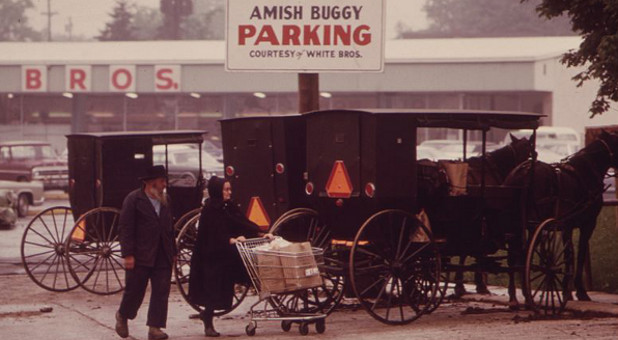The debate over U.S. healthcare reform that has gripped the nation and led to a government shutdown is of small concern in rural Pennsylvania’s Amish country for a very simple reason.
Along with eschewing cars and many other modern technologies, the descendants of 18th-Century German immigrants who practice the Amish and Old Order Mennonite religions, have effectively opted out of Obamacare, along with most federal safety net programs.
A little-known provision of the law with its roots in a 1950s battle over Social Security exempts these communities from the individual mandate, an element of the Affordable Care Act that requires most Americans to purchase health insurance in some form.
But it is not the idea of health insurance the Amish reject—the close-knit communities essentially insure themselves.
“We have our own health care,” said a retired Amish carpenter, who like other Amish interviewed for this story, asked that his name not be used because of a traditional aversion to publicity and bringing attention to oneself.
“They (hospitals) give you a bill,” he said. “If you can’t pay it, your church will.”
The Amish system is a little more complicated than that. Some 280,000 people live in Amish communities scattered through the United States, with the largest populations in Pennsylvania, Ohio and Indiana, according to research by Elizabethtown College in Pennsylvania.
While practices vary by community, most Amish fund their health care through a system that merges church aid, benefit auctions and negotiated discounts with local hospitals – promising quick cash payment in exchange for lower rates.
“The way they come together to pay for health care is amazing,” said Jan Bergen, chief operating officer at Lancaster General Health. “It’s a tithing. Their sense of responsibility extends beyond themselves and to the community.”
The Amish exemption to Obamacare dates back nearly 60 years to when Congress extended the Social Security tax to the self-employed and to farmers. Many Amish refused to pay. The Internal Revenue Service moved to enforce the law, sometimes with disastrous public relations consequences.
“There was an Amish guy who refused to pay Social Security. IRS agents confiscated his horses while he was out in the field plowing,” said Donald Kraybill, author of “The Amish” and professor at Elizabethtown College.
In 1965, Congress passed a law giving certain Amish and Mennonite religious orders the right to opt out of Social Security, Medicaid and a host of other government benefits.
“The basic religious reason driving their resistance is that, as a religious faith, the church community should take care of its own members,” said Kraybill. “If there’s a disaster like a tornado, fire or hospital bill, the community should come together for that.”
The Obamacare exemption is an extension of the Social Security exemption.
“We don’t want government paying for our things,” said an Amish man from Kinzers, Pennsylvania. “We want to pay our own way.”
The man from Kinzers said his community relies on two funds. Nearly every family contributes monthly to a hospital aid fund, while large bills are also paid with free-will offerings.
Some Amish carry benefit cards, which identify them as members of a community but do not bear names or photographs, to help hospitals keep track of those discounts.
“It simply says they’re a participant,” said Eric Buck, president of Preferred Health Care, which manages the Old Order Group coverage plan for Lancaster County Amish.
One factor that helps keep medical bills down is that farm work and other manual labor keep Amish active for most of their lives, making them less susceptible to chronic conditions like diabetes and heart disease that plague the often-sedentary U.S. population, said Bergen, the hospital executive.
Amish children are more susceptible to recessive genetic disorders, the result of a small and largely insular population.
For the heaviest bills, Amish communities often turn to benefit auctions, nicknamed “mud sales” because of the conditions of the fields where they are held.
On a recent Saturday auction in Gordonville, Pennsylvania, located 10 miles east of Lancaster, young Amish men bid used buggies up to more than $4,000, while hand-made quilts sold for several hundred dollars each.
Most mud sales and benefit auctions benefit specific institutions. The one in Gordonville helped pay bills for the volunteer ambulance company. But a series of five held across the state each year help fund the Clinic for Special Children, a world-class pediatric genetics clinic.
Many Amish at the auction said they had relied on hospital aid to pay their medical bills.
“It’s not stressful,” said an Amish man at the auction. “It’s there when you need it.”
(Editing by Scott Malone and Jackie Frank)
© 2013 Thomson Reuters. All rights reserved.
See an error in this article?
To contact us or to submit an article






















